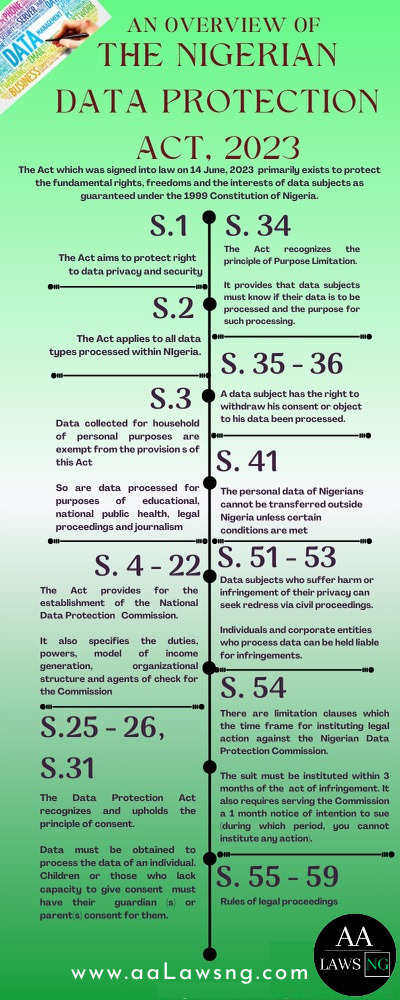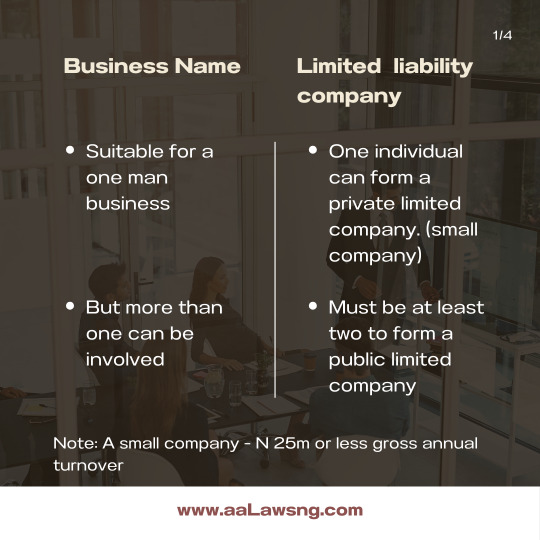#aalawsng
Text
The Nigerian Data Protection Act 2023
Data is information stored in a structured way.
Data should be protected to ensure privacy and prevent misuse.
Data protection legislation sets rules for how data should be handled to keep it safe and respect individuals' rights.

#nigeriandataprotection#dataprotectionlaw#nigerianlaw#law#nigerianlawfirm#nigerianlawpractice#aalawsng#avielavenantelawpractice#dataprotectionact#nigeriandataprotectionact#nigeriandataprotectionact2023
2 notes
·
View notes
Text

#dataprotection #dataprotection2023 #nigerianlaw #aaLawsng #dataprocessing #law #DataProtection #DPLOverview
#DataRights #DigitalPrivacy
#SecureData #PrivacyTrends
#DataGuard #DigitalRights
#InfoSafety #LawAndPrivacy
0 notes
Text
WILL PART 2

REQUIREMENT OF A VALID WILL
A valid will must be in writing: It is imperative that a person has to take note of this important condition that a will can be typed, printed, or handwritten. It is a legally binding document that must be made in writing in order for it to be enforceable.
An individual of legal age can make a valid, He/she must be at least 18 years of age, with sound mind meaning that he/she understands that a will is being made and is the same as at the time of making the will.
A will must be made voluntarily without any external influence.
The will must be signed by the testator or any person he chooses on his behalf who then must sign in his presence and by his directions.
The testator must acknowledge his signature in presence of two (2) witnesses who must be present at the same time. Acknowledgement can be by word or conduct
The witnesses must themselves sign the will in presence of the testator. It is important to note that a witness cannot be a beneficiary to a will, and any gift given to a witness will be null and void. Choosing people who are not beneficiary to the will as witnesses will prevent a conflict of interest and ensure confidentiality. Therefore, the testator’s spouse and children cannot attest to a will, since they are definitely going to be beneficiaries in it.
A blind person can make a valid Will and there must be a Caveat in the Will stating that the Will was read to the blind person and was signed by the person. However a Will can not be attested by a blind person.
There is however an exception to the making of a Will, a person who is not of a legal age and serves under any form of military service can make a valid Will.
CONTENTS OF A VALID WILL
The full name and address of the testator.
The names and address of the executors who will be in charge of the testator’s assets and ensure that the wishes under the will are carried out.
The full names and addresses of the beneficiaries in the will, and where the beneficiaries are minors, the particulars of the guardian appointed for them.
A full list and particulars of the testator’s assets; all the assets of the testator both real and personal should be listed, and how he wants the assets shared among the beneficiaries.
The names and addresses of witnesses to the will.
Signatures of the testator and that of the Witnesses.
REVOCATION OF A WILL
There are four ways in which a Will may be revoked as follows; by marriage, by making another Will, by writing to revoke and by destruction.
Revocation of Will by Marriage: The testator’s marriage will automatically revoke any existing wills and codicils.This revocation occurs by operation of law, whether or not the testator wishes or intends such a revocation. Unfortunately, not all married persons are privy to the knowledge of this deemed revocation and the law may occasionally be viewed as creating some hardship to the disappointed beneficiaries. The rationale for this rule however, is to ensure that any children and new spouse will benefit, that is by creating an intestacy in the absence of a new will. In Section 11 Wills Edict 1990 0f Lagos State, the typical law states:
“Every Will made by a man or woman shall be revoked by his or her marriage (other than a marriage in accordance with customary law) except: A will expressed to be made in contemplation of the celebration of that marriage. Provided that the names of the parties to the marriage contemplated are clearly stated”.
An exception to this general rule is made if, and only if,
Wills made in exercise of a power of appointment in which the person appointed will not default of the appointment but it passes to his or her executor or administrator.
Wills expressed to be made in contemplation of celebration of a marriage where the names of the parties to the marriage contemplated are clearly stated.
Revocation of Will by Voluntary Act: Pursuant to Section 14 of the Wills Act, a will may be revoked, in whole or in part, by the formal execution of a written declaration of revocation, whether this declaration stands alone or is found as part of a subsequent will or codicil. To be effective, however, the testator must intend to rescind the prior will, in whole or in part. It requires both a written declaration expressing the testator’s intent to revoke the prior will and requires that such a declaration be properly executed in compliance with the Wills Act formalities. Most often the revocation will be included in a new will or codicil however that is not required so long as the declaration of revocation is properly executed in compliance with the Wills Act formalities. From a practice standpoint therefore, where a testator wishes to make changes to a previous will, we suggest the safest practice is usually to start again by drawing a new will revoking the previous will entirely and thus avoiding any confusion. The words of revocation are not clear, the earlier will remain.
Revocation of Will by Destruction: a will, or part of a will may be revoked by the destruction of the will by the testator or by the testator’s direction and by sufficient destruction, with the testator’s intention of revocation. The intention to destroy and the act of destruction must coexist for a valid destruction. The Wills Act requires both that the testator intends a revocation by destruction and witness or participate in that destruction, whether it be the testator or his or her agent who physically effects the destruction. Partial destruction will not revoke the entire will unless those parts of the will left intact cannot stand on their own. The destruction must not merely be symbolic, but result in actual 'physical injury' to the will, such as cutting the will into bits which could not be pieced together or total incineration. The intention to revoke, no matter how clear it may be, is not enough without a completed act of destruction of the will. Similarly, destruction without intention to revoke does not revoke the will.
#EstatePlanning#LegalAdvice#WillsAndTrusts#ExecutorResponsibilities#FamilyLegacy#FinancialPlanning#ProbateProcess#InheritanceRights#TestamentaryCapacity#Guardianship#AssetDistribution#ProtectYourLegacy#LegalTips#WillsLaw#RevocableTrust#aalawsng#lawfirmsinibadan
0 notes
Text
WILL PART 2
REQUIREMENT OF A VALID WILL
A valid will must be in writing: It is imperative that a person has to take note of this important condition that a will can be typed, printed, or handwritten. It is a legally binding document that must be made in writing in order for it to be enforceable.
An individual of legal age can make a valid, He/she must be at least 18 years of age, with sound mind meaning that he/she understands that a will is being made and is the same as at the time of making the will.
A will must be made voluntarily without any external influence.
The will must be signed by the testator or any person he chooses on his behalf who then must sign in his presence and by his directions.
The testator must acknowledge his signature in presence of two (2) witnesses who must be present at the same time. Acknowledgement can be by word or conduct
The witnesses must themselves sign the will in presence of the testator. It is important to note that a witness cannot be a beneficiary to a will, and any gift given to a witness will be null and void. Choosing people who are not beneficiary to the will as witnesses will prevent a conflict of interest and ensure confidentiality. Therefore, the testator’s spouse and children cannot attest to a will, since they are definitely going to be beneficiaries in it.
A blind person can make a valid Will and there must be a Caveat in the Will stating that the Will was read to the blind person and was signed by the person. However a Will can not be attested by a blind person.
There is however an exception to the making of a Will, a person who is not of a legal age and serves under any form of military service can make a valid Will.
CONTENTS OF A VALID WILL
The full name and address of the testator.
The names and address of the executors who will be in charge of the testator’s assets and ensure that the wishes under the will are carried out.
The full names and addresses of the beneficiaries in the will, and where the beneficiaries are minors, the particulars of the guardian appointed for them.
A full list and particulars of the testator’s assets; all the assets of the testator both real and personal should be listed, and how he wants the assets shared among the beneficiaries.
The names and addresses of witnesses to the will.
Signatures of the testator and that of the Witnesses.
REVOCATION OF A WILL
There are four ways in which a Will may be revoked as follows; by marriage, by making another Will, by writing to revoke and by destruction.
Revocation of Will by Marriage: The testator’s marriage will automatically revoke any existing wills and codicils.This revocation occurs by operation of law, whether or not the testator wishes or intends such a revocation. Unfortunately, not all married persons are privy to the knowledge of this deemed revocation and the law may occasionally be viewed as creating some hardship to the disappointed beneficiaries. The rationale for this rule however, is to ensure that any children and new spouse will benefit, that is by creating an intestacy in the absence of a new will. In Section 11 Wills Edict 1990 0f Lagos State, the typical law states:
“Every Will made by a man or woman shall be revoked by his or her marriage (other than a marriage in accordance with customary law) except: A will expressed to be made in contemplation of the celebration of that marriage. Provided that the names of the parties to the marriage contemplated are clearly stated”.
An exception to this general rule is made if, and only if,
Wills made in exercise of a power of appointment in which the person appointed will not default of the appointment but it passes to his or her executor or administrator.
Wills expressed to be made in contemplation of celebration of a marriage where the names of the parties to the marriage contemplated are clearly stated.
Revocation of Will by Voluntary Act: Pursuant to Section 14 of the Wills Act, a will may be revoked, in whole or in part, by the formal execution of a written declaration of revocation, whether this declaration stands alone or is found as part of a subsequent will or codicil. To be effective, however, the testator must intend to rescind the prior will, in whole or in part. It requires both a written declaration expressing the testator’s intent to revoke the prior will and requires that such a declaration be properly executed in compliance with the Wills Act formalities. Most often the revocation will be included in a new will or codicil however that is not required so long as the declaration of revocation is properly executed in compliance with the Wills Act formalities. From a practice standpoint therefore, where a testator wishes to make changes to a previous will, we suggest the safest practice is usually to start again by drawing a new will revoking the previous will entirely and thus avoiding any confusion. The words of revocation are not clear, the earlier will remain.
Revocation of Will by Destruction: a will, or part of a will may be revoked by the destruction of the will by the testator or by the testator’s direction and by sufficient destruction, with the testator’s intention of revocation. The intention to destroy and the act of destruction must coexist for a valid destruction. The Wills Act requires both that the testator intends a revocation by destruction and witness or participate in that destruction, whether it be the testator or his or her agent who physically effects the destruction. Partial destruction will not revoke the entire will unless those parts of the will left intact cannot stand on their own. The destruction must not merely be symbolic, but result in actual 'physical injury' to the will, such as cutting the will into bits which could not be pieced together or total incineration. The intention to revoke, no matter how clear it may be, is not enough without a completed act of destruction of the will. Similarly, destruction without intention to revoke does not revoke the will.
#EstatePlanning#LegalAdvice#WillsAndTrusts#ExecutorResponsibilities#FamilyLegacy#FinancialPlanning#ProbateProcess#InheritanceRights#TestamentaryCapacity#Guardianship#AssetDistribution#ProtectYourLegacy#LegalTips#WillsLaw#RevocableTrust#aaLawsng#lawfirmsinibadan
0 notes
Text
DIFFERENCES BETWEEN BUSINESS NAME AND LIMITED COMPANY






#entrepreneur#BusinessTips#Entrepreneurship#businessname#limitedcompany#Startup#BusinessAdvice#SuccessTips#EntrepreneurLife#BusinessOwners#MarketingStrategy#Leadership#aalawsng#lawfirmsinibadan
0 notes
Text
WILLS PART 1

WHAT IS A WILL?
A will is a testamentary disposition of one's property, voluntarily made by the testator, signed by the testator by himself or the testator appointing someone to sign on his behalf in the presence of at least two witnesses and it becomes operative upon the death of the testator. A male who writes his Will is known as a TESTATOR while a female is known as a TESTATRIX.
The state of having made a valid Will before one dies is known as TESTATE, while the state of not having a valid will before death is known as INTESTATE.
TYPES OF WILLS
The following are the types of Wills
Statutory Will: These are wills made in accordance with the provisions of the Wills Act 1837 or the relevant Wills law of the testator’s state. The features of a statutory will are:
It must be in writing pursuant to section 9 Wills Act 1837. Any form of language will suffice. It can be holographic in nature(handwritten) or typed.
It must be attested by at least 2 witnesses in the presence of the testator
It must be duly executed by the testator in the presence of at least two witnesses.
The testator must have testamentary capacity and intention
The testator is of statutory age.
Nuncupative Will: Oral Will made according to customary law by a person in anticipation of imminent death as to the disposition of his property.There are conditions to be fulfilled before there can be a valid nuncupative will:
The directives must be made in presence of at least two witnesses.
It has to be made voluntarily.
The testator must have testamentary intention and sound mind.
The beneficiaries must be specifically named and described so as to be ascertainable and identifiable
The gifts (properties) must be specifically named and described so as to be ascertainable and identifiable
Privileged Will: This is a departure from the essentials of a valid will in the sense that such a will is said to be valid if it is attested to by just one officer. All they require to be valid is that they must be made by those who are entitled to make privileged Wills and they must be in writing and attested to by at least one person. The persons who are entitled to make privileged Wills are:
a) A mariner or seaman being at sea. See section 6 Wills Law of Lagos; section 11 Wills Act.
b) A crew of a commercial at air. See section 6 Wills Law of Lagos; section 11 Wills Act
c) Military personnel in active military service However, under s. 276 Armed Forces Act, section 193 Air Force Act there are two conditions which a soldier making a privileged will must satisfy
i) The will must be in writing
ii)It must be signed by the military personal in the presence of a witness and the witness must attest to the signature in his presence.The will must be attested by an officer also in actual service or a government medical officer
Written Customary Wills: Where the written customary law will was not drafted by a solicitor, it must be proved to be genuine. To prove this validity, a party needs to show that the testator was an adult, knew what he was doing and its effect, and had made the will in the presence of one or more adult witnesses. A written will is usually a typed Will that has to be dated and signed in front of two witnesses. The two witnesses must also sign the Will. All three (you and your two witnesses) must be together when signing. The two witnesses cannot be beneficiaries under the Will. A written Will is governed by law and statutes.
IMPORTANCE OF A WILL
A testator's Will permits them to do the following:
Assign the assets to friends and family in accordance with his or her wishes.
Select dependable executors who will take the beneficiaries' interests into consideration.
Make burial and funeral plans in advance.
Assign guardians to minors.
Restrict or eliminate the use of family customs, rules, and traditions
Aid in removing or lessening hostility between family members
Capacity to make a Will
All adults are inevitably able to make a will. Nonetheless, it is crucial to note the following:
An infant unless in actual military service or a seaman cannot make a Will. (An infant is under 18 years of age)
A mentally disabled person cannot make a valid Will whilst this disability subsists.
A blind person can make a Will, but it has to be shown that the Will was read to him and he appeared to perfectly understand the contents before he attested to it. An attestation clause will usually suffice for this type of person.
An illiterate can make a Will, but it must be shown that the contents were read over to him and that he appeared perfectly to understand and approve of same. An attestation clause similar to the blind person above will be useful for this type of individual.
#WillsAndTestaments#EstatePlanning#LegalAdvice#InheritanceRights#FamilyLegacy#LegalKnowledge#Guardianship#TestamentaryCapacity#EstateAdministration#WillsAct#NigerianLaw#Law#AALawsNG#AvielAvenanteLawPractice
0 notes
Text





TAX CLEARANCE CERTIFICATE REQUIRED TO OBTAIN FOREIGN CURRENCY FROM BANKS
#forex#foreignexchange#taxation#taxlaw#nigeriantaxation#nigerianlaw#law#tcc#taxclearance#taxclearancecertificate#aaLawsng#avielavenantelawpractice#banking#finance
0 notes
Text
Video of a brief conversation explaining that there are limitations to the incorporation of businesses with the Corporate Affairs Commission (CAC) as business names, and some businesses must compulsorily be incorporated as limited liability companies LLC/ LTD to function legally base on CAMA 2020 (Companies & Allied Matters Act 202)
By Adeola Kolawole of Aviel Avenante Law Practice (AALAWSNG)
#law#corporateaffairscommission#aalawsng#avielavenantelawpractice#business#entrepreneur#nigerianlaw#cac
0 notes
Text
Annual Returns for Incorporated Trustees
Incorporated Trustees, a registration type with the Corporate Affairs Commission (CAC), encompass various entities such as non-profit organizations, religious entities, clubs, and other NGOs. The individuals overseeing these organizations are termed trustees, constituting the board of trustees.
It should be particularly noted that they are not called directors.
Mandated by law, Incorporated Trustees must file annual returns between June and December. Failure to meet this obligation incurs a default fee on the organization after December 31.
Annual return filings must include either an audited financial statement (for active operations) or a statement of affairs (for inactive periods), reflecting the organization's current status.
Timely submission of annual returns is crucial to avoid incurring default fees, emphasizing the importance of adherence to filing deadlines.
#law#cac#entrepreneur#business#corporateaffairscommission#nigerian law#aalawsng#avielavenantelawpractice#ngo#ngo registration
0 notes
Text






For dealers in regulated products such as medicines, alcoholic beverages and herbal medicines, here are the NAFDAC guidelines regulating advertising:
0 notes
Text
A brief video distinguishing between the often conflated categories - Tax Returns Vs. CAC Annual Returns
#taxlaw#taxation#corporatelaw#corporateaffairscommission#cac#nigerianlaw#law#aaLawsng#avieLavenanteLawpractice#annualreturns
0 notes
Text




On the Assessment of the Quality & Safety of Investment Options Vis A Vis Celebrity Options
#realestate #realestatelaw #land #investment #law #nigerianlaw #aaLawsng #avieLavenanteLawpractice
0 notes
Text
Honoring the impact and dedication of NGOs around the globe on this World NGO Day!
From healthcare and education to environmental conservation and social justice.
NGOs champion causes that shape a better world.
We celebrate them.
#worldngoday#ngo#nongovernmentalorganisation#nonprofits#nonprofitorganization#aaLawsng#avielavenantelawpractice
0 notes
Text
On The Tenancy Agreement & Its Real Purpose
During negotiations on tenancy rates between prospective tenants and the agents marketing to them, the phrase “agreement and commission” invariably features.
Regarding the ‘agreement’ aspect of that phrase, it should be noted that this fee is not a meaningless statutory charge always payable along with rents. Many pay agreement fees along with their rents without an understanding of its purpose, rather considering it merely a compulsory part of the rent package.
It’s crucial, however, to realize that this fee has a definite purpose.
Here is What Really Ought to Obtain
Upon paying the agreement fee, the tenant is entitled to a tenancy agreement document. This document is essential, and by no means superfluous.
It outlines the terms of the tenancy, including rights & responsibilities of both landlord and tenant, as well as eviction protocols, and tenancy termination modalities.
The tenancy agreement comprehensively details the conditions of the tenant’s and landlord’s relationship.
In summary, as soon as any intending tenant is billed for agreement and commission, it becomes imperative to request the tenancy agreement document.
#law#nigerianlaw#tenancy#tenancylaw#realestate#commission#agreementandcommission#rent#aalawsng#avielavenantelawpractice
1 note
·
View note
Text
ON THE CORPORATE AFFAIRS COMMISSION DIRECTIVE TO COMPANIES TO ALLOT ALL UNISSUED SHARES
For Leaders of Companies:
There was a regulatory directive to companies to allot all their shares by December 31, 2022. The directive stated further that all shares still unissued after the deadline would remain unrecognized as part of the company's share capital until fully issued or the company should otherwise reduce their share capital accordingly.
Kindly note that for affected companies i.e. those with yet to be allotted shares, penalties have been accruing on a daily basis since January 1, 2023.
Leaders of Limited Liability Companies wish unallotted shares should act as soon as possible to issue all shares and hence limit the amount of penalties which they would have to part with to the Corporate Affairs Commission.
Further enquiries are welcome.

#ComplianceMatters#BusinessOwners#CACRegulations#ShareCapital#LegalAdvice#law#shares#ltd#llc#corporateaffairscommission#nigerianlaw#aalawsng#avielavenantelawpractice
1 note
·
View note
Text
#musiccontracts#musiclawyer#musicindustry#recordlabel#musicproducer#musician#entertainmentlaw#copyrightlaw#musicbusiness#musicindustrylaw#contractlaw#negotiation#musiccareer#musicproduction#recordlabels#entertainment#law#nigerianlaw#aalawsng#avielavenantelawpractice#virtuallawpractice#virtuallawfirm
0 notes